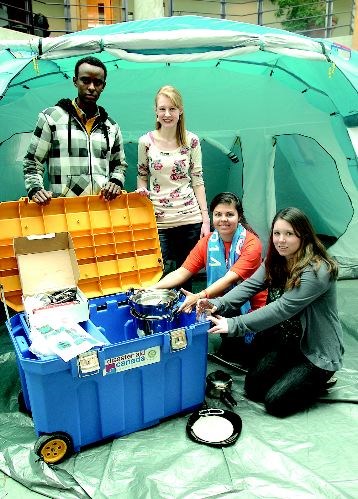With the help of someone who spent most of his formative years in one, University of Northern British Columbia (UNBC) students gained a glimpse of life in a refugee camp on Tuesday.
Complete with a tent and a display of food rations, a mock refugee camp was set up in the Wintergarden on the campus and Abdi Mohammed was there to guide visitors and answer their questions.
Mohammed, 23, hails from Kismayo, a port city on the southern tip of Somalia, but for 17 years of his life, all he knew was a refugee camp near the northern border of Kenya.
His family fled the country in 1991 when civil war broke out in Somalia, which is now considered a failed state.
Life is only marginally better in the camp where families live in tents, they're rarely allowed to travel anywhere else and food is rationed.
Every 15 days the United Nations' refugee agency will dole out to each person three kilograms of flour, a cup of peas, a cup of oil, a half cup of salt and a half cup of sugar.
"You'll have breakfast and you'll have dinner and lunch you skip," said Mohammed. "And everyone eats together, communal, to make it last the 15 days. It's really a struggle."
A slightly smaller version of the five-by-five-metre tent Mohammed's mother, three sisters and four brothers have been calling home - his father was killed in the war - was set up to give an idea of the cramped quarters they live in.
"You have your food, clothing, books, everything in the tent," he added.
Mohammed is working towards a degree in business and he has UNBC students to thank for getting him into the university. Two dollars of a UNBC student's fees go towards WUSC which in turn uses the money to bring an refugee to this country to receive a university education.
"With support of the local committee and the support of everyone at UNBC, life is really good," Mohammed said.
WUSC covered the first year of Mohammed's education - tuition and accommodation - he's now taking on student loans, "just like a Canadian student," and worked at a gas station in Edmonton over the summer between his first and second years.
The weather has been the biggest difference between living in Sub-Saharan Africa and north central B.C.
"Back home, the temperature would be a minimum of 20 degrees," he said. "For here that's very hot but for me it's very cold. What they call a summer in Canada is a winter in Kenya, actually."
Mohammed said he would like to return to Somalia but only once peace and security have been achieved and he's happy to stay in Canada. He does plan to return to Kenya in a few years to visit his family and by then, he hopes to have a designation as a chartered accountant.
"Most students [in the refugee camps] know about the WUSC program and most students want to get out of the refugee camp and the only way they can do that is to get good grades in school," Mohammed said.


